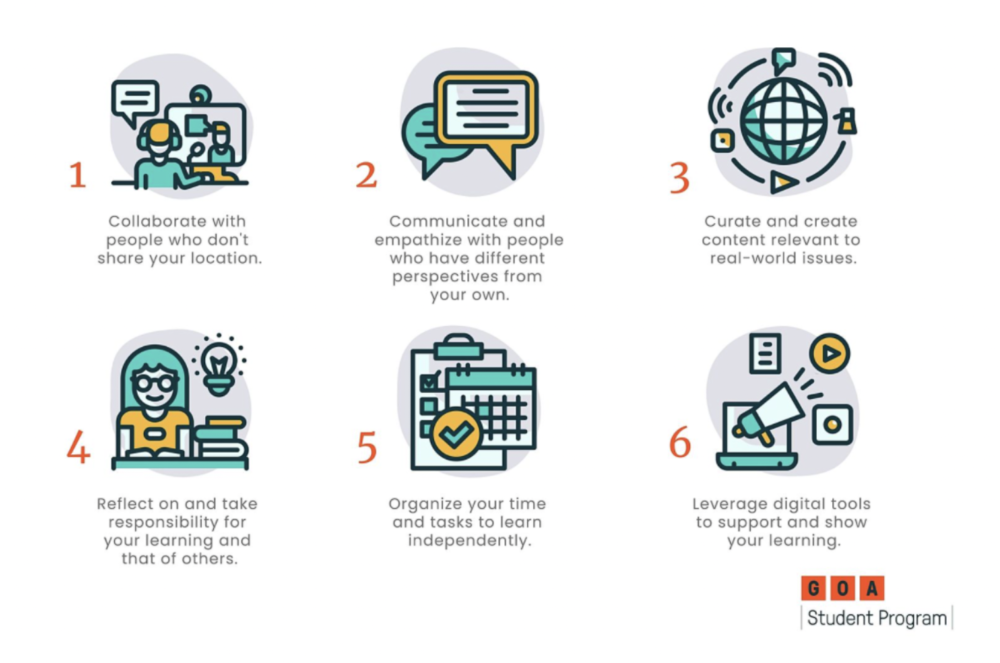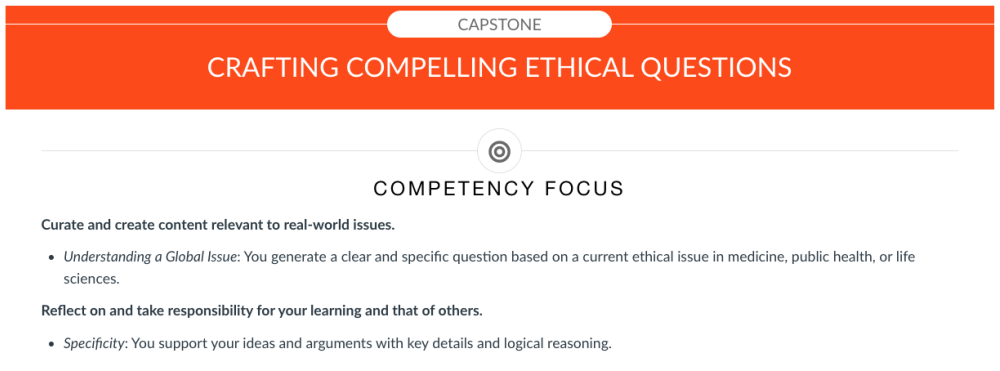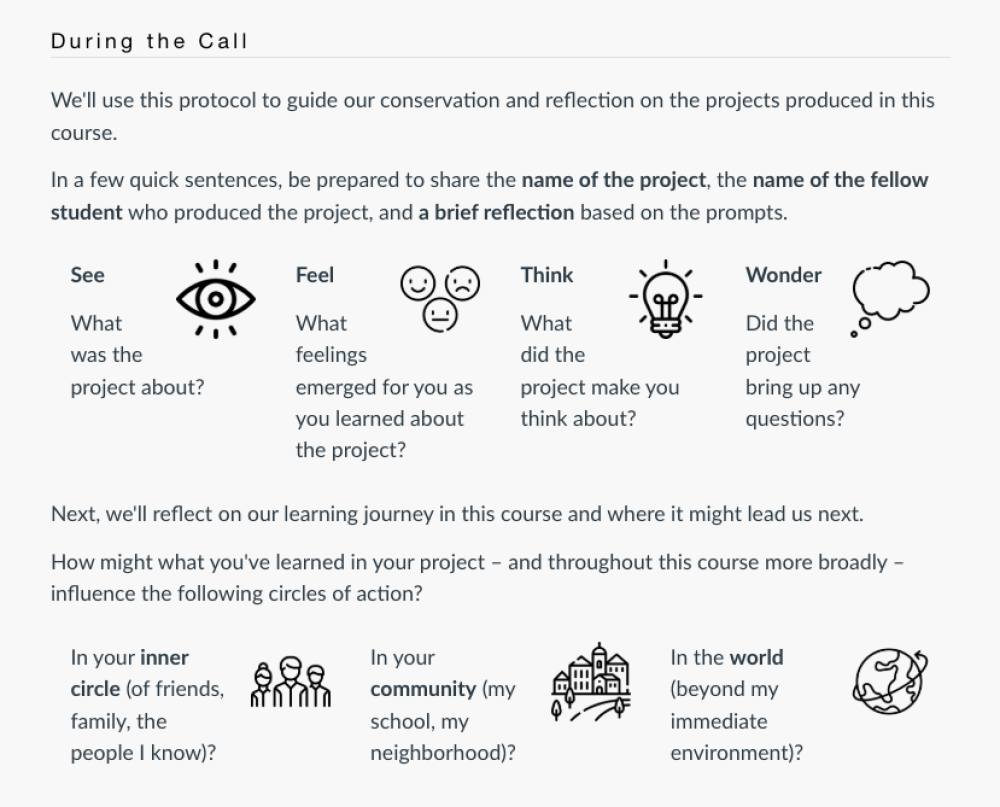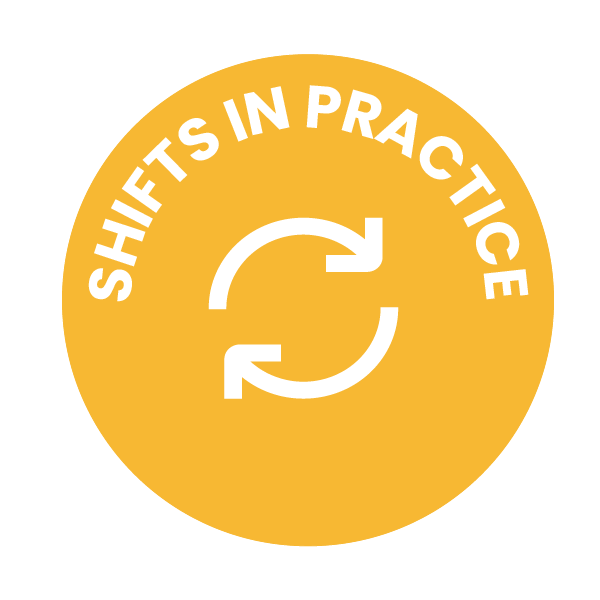Assessing Growth and Mastery: How Capstone Promotes Feedback, Iteration, and Reflection in Student Learning
GOA’s Global Capstone Experience takes a dynamic, growth-focused approach to assessment. By integrating multiple feedback loops, fostering continuous iteration, and emphasizing reflection, Capstone encourages students to take ownership of their learning process. In this post, we’ll explore how these strategies work together to cultivate not just subject mastery, but also the critical thinking, adaptability, and metacognitive skills essential for lifelong learning.
Bridging Core Skills with Subject Mastery
In recent years, GOA has refined its assessment approach by re-centering on our six foundational Core Competencies, while defining Course-Specific Outcomes that assess students’ ability to apply these core skills within the context of their subject area. This model asks: how can broad competencies be interpreted within the specificity of each domain? This approach ensures that students not only develop transferable skills, such as critical thinking, communication, and collaboration, but also demonstrate mastery within their specific disciplines.

GOA's Six Core Competencies for Students
Faculty play a crucial role in contextualizing these competencies within their areas of expertise, ensuring assessments are both authentic to the domain and aligned with broader skills. Across all Capstone courses, assessments integrate discipline-specific outcomes, defining what mastery looks like in the subject while reinforcing GOA’s Core Competencies.
The Global Capstone Experience begins with the identification of a compelling question, but how students research, analyze, and present their findings varies by course. For example, in the Bioethics course, students build on earlier content to explore ethical questions in medicine, public health, and the life sciences. Students are assessed on their ability to generate clear, specific ethical questions within these realms and support their arguments with research and ethical frameworks.

This model aligns assessment with both universal competencies and discipline-specific outcomes, helping students develop essential skills while demonstrating expertise in their field. Capstone projects reflect this balance, offering students the opportunity to engage deeply with their subject matter while honing skills that will serve them beyond the classroom.
Assessing Learning as a Process
Capstone prioritizes an iterative learning process, shaped through multiple feedback loops. Students engage in structured checkpoints where they receive formative feedback from teachers, peers, and trusted adults. These touchpoints encourage students to refine their work in real time, capturing growth over time. Assessment not only measures content mastery but also focuses on students' ability to prepare for future learning and incorporate diverse perspectives, supported by substantive feedback, into their work.
In the Architecture course, for example, students are asked to share their work-in-progress with someone from their school community. This assignment prompts students to reflect on their learning, incorporating feedback from a trusted adult to refine their work. Students must identify which feedback they plan to act on, outline their revision plan, and note any questions or uncertainties they have. This iterative process allows students to assess their progress, adjust their approach, and deepen their understanding.
In this context, the teacher uses the outcome "Preparation for future learning: You generate specific suggestions about how you can change your approach to learning" to assess students’ ability to iterate. This outcome probes for evidence that students can clearly articulate how they will adapt based on feedback and demonstrates a growth-oriented mindset.
This iterative process reflects real-world work, where revisions are key to improving quality, and continuous growth comes from applying feedback and reflection.
Measuring Growth and Metacognition
Reflection is a key component of Capstone, providing valuable insight into how students think about their learning. Students are asked to analyze why their work matters, how their thinking has evolved, and how they can apply their learning in new contexts.
The Global Capstone Experience culminates in the Capstone Summit, a series of synchronous gatherings where students share their projects, make connections, and discuss the impact of their work. To complement this, each GOA class incorporates a final reflection touchpoint where students engage in small group conversations, reflecting on their work and the broader impact on themselves, their communities, and the world.

While reflection is consistent across all Capstone courses, its assessment varies. It is not about grading the quality of the reflection itself, but about assessing the thinking skills demonstrated within it. For example, in the Developmental Psychology course, reflection is assessed based on two outcomes:
Context: You communicate how both nature and nurture impact developmental phenomena.
Perspective Taking: You differentiate commonalities in development from cultural influences and individual variability.
These outcomes assess the depth of analysis and evidence of growth in the students’ thinking, particularly in understanding diverse human development experiences. By assessing analysis, growth, and application, we reinforce metacognition – preparing students for lifelong learning, critical thinking, and adaptability in an ever-changing world.
For more, see:
- Redesigning the Global Capstone: How Participatory Design Transforms Learning
- Creating Spaces for Dialogue That Matters: World Cafe
- Personalized Pathways: How Member Schools Help Students Expand Their Learning Through GOA

This post is part of our Shifts in Practice series, which features educator voices from GOA’s network and seeks to share practical strategies that create shifts in educator practice. Are you an educator interested in submitting an article for potential publication on our Insights blog? If so, please read Contribute Your Voice to Share Shifts in Practice and follow the directions. We look forward to featuring your voice, insights, and ideas.
GOA is a nonprofit learning organization that reimagines learning to empower students and educators worldwide. In partnership with our global network of 150 schools, we provide interactive, relationship-driven courses, expert resources, and innovative thinking that help to expand and elevate academic programs. Together, we help students and educators become open to the extraordinary.
Follow us on LinkedIn for the latest learning opportunities and news. Sign up for GOA Insights, our newsletter focused on innovative ideas and best practices for the future of learning. Become a Member School.
